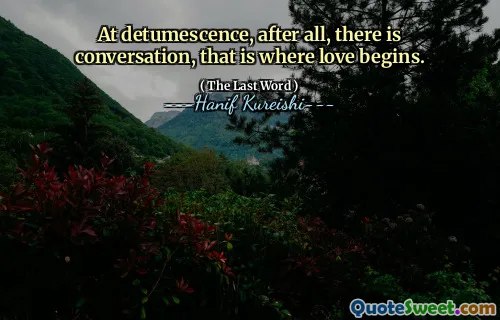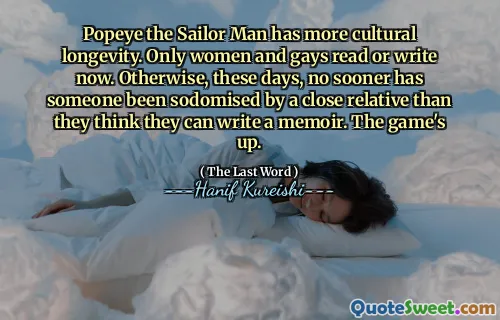
At detumescence, after all, there is conversation, that is where love begins.
In Hanif Kureishi's work, the notion that love begins after a moment of tension or climax—here represented metaphorically by 'detumescence'—highlights the importance of vulnerability and open communication in the development of genuine connection. Detumescence, a term often associated with the subsiding of swelling or tension, symbolizes a state where temporary intensity diminishes, giving space for reflection and dialogue. It suggests that true intimacy isn't just found in moments of heightened emotion or physical consummation but unfurls afterward through meaningful conversation and understanding. This idea resonates because it emphasizes that relationships are cultivated in the quiet, often overlooked moments where two people can connect beyond superficial engagement.
Love, in this context, is portrayed as a process—one that evolves not merely through passion but through shared words, empathy, and genuine exchange. When the intensity fades, it leaves room for clarity, vulnerability, and the acknowledgment of deeper feelings. Such conversations act as the fertile ground where love takes root and flourishes. It’s a reminder that the aftermath of passion should be valued equally, if not more, than the passion itself, as it's in these moments that authentic bonds are built.
This perspective invites reflection on the nature of relationships in our fast-paced world. Often, we focus on the peak moments—the thrill of romance or success—ignoring the foundational dialogues that sustain us through the quieter times. Kureishi’s insight champions the idea that love's true beginning is grounded in the calm, honest conversations that follow intense experiences, harping on the significance of emotional honesty and consistent communication for meaningful connections.
In essence, the quote underscores a universal truth—that after the crescendo, the real work of understanding and bonding begins in conversation. It reminds us to cherish those quieter, reflective moments as essential to love's growth, encouraging a more conscious, mindful approach to relationships.
--(The Last Word)--Hanif Kureishi







